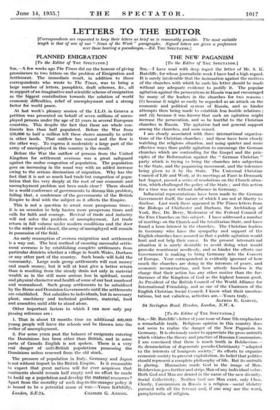THE NEW PAGANISM
[To the Editor of THE SPECTATOR.] have read with deep regret the letter of Mr. S. K. Ratcliffe, for whose journalistic work I have had a high regard. It is surely intolerable that the insinuation against the motives of the churches with which he ends his letter should be made without any adequate evidence to justify it. The popular agitation against the persecutions in Russia was not encouraged by many of the leaders in the churches for two reasons : (I) because it might so easily be regarded as an attack on the economic and political system of Russia, and so hinder attempts then being made to establish less hostile relatioris ; and (2) because it was known that such an agitation might increase the persecution, and so be hurtful to the Christian churches in Russia. The agitation had not general support among the churches, and soon ceased.
I am closely associated with three international organiza-
tions of the Christian churches ; and these have been closely watching the religious situation, and using quieter and more effective ways than public agitation to encourage the German churches ivhich. are contending for the Gospel and the prin- ciples of the Reformation against the " German Christian " party which is trying to bring the churches into subjection to the State, and the paganizing movement, and the tolerance being given to it by the State. The Universal Christian Council of Life and Work, at its meetings at Fano in Denmark last August, passed a series of resolutions on the Church situa- tion, which challenged the policy of the State ; and this action for a time was not without influence in Germany.
Influential representations have been made to the German
Government itself, the nature of which I am not at liberty to disclose. Last week there appeared in The Times letters from the Bishops of Chichester and Durham, the Archbishop of York, Rev. Dr. Berry, Moderator of the Federal Council of the Free Churches on this subject. I have addressed a number of meetings on the Church and the totalitarian State, and have found a keen 'interest in the churches. The Christian leaders in Germany who have the sympathy and support of the English churches have assured us that a public agitation would hurt and not help their cause. In the present international situation it is surely desirable to avoid doing what would provoke resentment needlessly, and so hinder the efforts our Government is making to bring Germany into the Concert of Europe. Your correspondent is evidently ignorant of how much the churches are doing in the interests of peace, and economic reconstruction, and how utterly baseless is the charge that their action has any other motive than the fur- therance of the Kingdom of God as the highest human good. As President of the British Council of the World Alliance for International Friendship, and as one of the Chairmen of the English Christian Social Council, I know what their unosten- tatious, but not valueless, activities are.—Yours truly,
ALFRED E. GARVIE.
34 Sevington Road, Hendon, London, N.W. 4.


















































 Previous page
Previous page